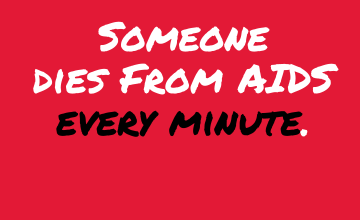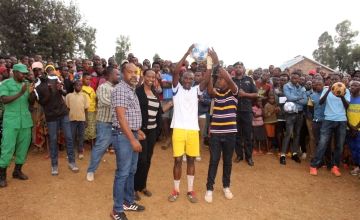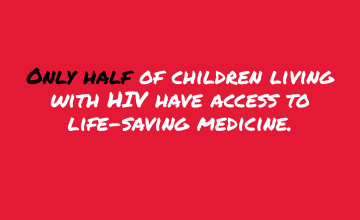
Read our 2023 annual report

Knowledge Hub
In 2022, someone still dies from AIDS every minute.
As we mark World AIDS Day on 1 December 2022, we look at the work we continue to do at Concern to alleviate the suffering of people who are still affected by the disease more than 40 years since its emergence.
The facts remain stark.
There were roughly 4,000 new HIV infections (adults and children) transmitted every day in 2021. 58% of these were in sub-Saharan Africa, with 1.5 million new infections globally in 2021.
New infections are at their highest among girls and young women in sub-Saharan Africa, and in 2021 this group accounted for 63% of all new HIV infections.
Most alarmingly of all, only half of children living with HIV have access to life-saving medicine in 2021.
“We can end AIDS - if we end the inequalities"

The UNAIDS theme for World AIDS Days 2022 is 'Equalize', with three main goals.
These are:
- Increase availability, quality and suitability of services, for HIV treatment, testing and prevention, so that everyone is well-served.
- Reform laws, policies and practices to tackle the stigma and exclusion faced by people living with HIV and by key and marginalised populations, so that everyone is shown respect and is welcomed.
- Ensure the sharing of technology to enable equal access to the best HIV science, between communities and between the Global South and North.
UNAIDS data on the global HIV response reveals that during the last two years of COVID-19 and other global crises, progress against the HIV pandemic has faltered, resources have shrunk, and millions of lives are still at risk. The 2030 Sustainable Development Goal of ending AIDS as a global health threat is just 7 years away.
“We can end AIDS - if we end the inequalities which perpetuate it,” says UNAIDS Executive Director Winnie Byanyima.
“To keep everyone safe, to protect everyone’s health, we need to Equalize.”
Concern's response to HIV and AIDS
The aim of Concern’s HIV and AIDS response work is to help reduce new HIV infection and to minimise the impact of HIV and AIDS among people living in extreme poverty.
Working in partnership with Sonke Gender Justice, a South African NGO specialising in gender equality, prevention of gender-based violence (GBV) and HIV, Concern mainstreams and integrates responses in all our sector and multi-sector programmes.
The ongoing pandemic had continued to interrupt HIV testing, treatment and support services in many Concern operational countries, due to health service disruption and lower uptake of services as many people stayed away from health facilities for fear of contracting COVID-19.
Conflict was a disruptive factor in some countries also.
In Liberia teams responded to HIV and AIDS through mainstreaming responses including awareness raising, community education, supporting positive attitudinal change and participating on local radio talk shows, ‘breaking the silence’.
In Pakistan, HIV was included at project inception during the assessments and for target population selection, and in South Sudan through condom distribution during mobile clinics, intentionally targeting people living with HIV and sensitising communities on HIV and AIDS testing, prevention and on the importance of treatment compliance for life.
Integration of HIV responses included a socio-economic component for the capacity building of pregnant and lactating women living with HIV in Kirundo Province in Burundi.
HIV and AIDS is integrated in Concern Democratic Republic of Congo’s (DRC) gender transformative approach, in messages on gender and HIV in the Irish Aid ANSARM project in Liberia, and in Pakistan, HIV is integrated in all actions, policies and guidelines.
In Asia, the HIV response in Bangladesh beyond awareness raising has focused on knowledge change.
Annual outcome monitoring reported that the percentage of men and women who correctly identify the two major ways of preventing sexually transmitted infections (STIs), HIV, and were able to reject two misconceptions about HIV transmission has increased to 45% (2021) from a baseline of 0.97% (2017), in the Irish Aid funded Improving the Lives of Urban Extreme Poor (ILUEP) programme.
Responding to the health education needs of vulnerable and conflict-affected households in Kaya Department, Lac Region in Chad, topics covered included proper handwashing, exclusive breastfeeding, food diversity, preventative measures against COVID-19, STI-HIV prevention, and on GBV.
Concern organised several awareness campaigns, which included messages on the prevention of HIV, followed by active discussions.

Concern Ethiopia targets HIV affected community members, providing information on transmission and prevention, on entitlements from government and linking them to social services. In Gambela where prevalence rates are amongst the highest in the country, Concern cooperates closely with other agencies with a view to ensuring efficient coordination in respect of health, disability, HIV and AIDS, TB and antenatal care activities.
Concern Kenya is continuing to support community health workers in undertaking household level messaging including prevention and management of HIV and AIDS among people infected and affected.
The Malawi Graduation programme has reported that the percentage of women and men who correctly identify the two major ways of preventing the sexual transmission of HIV and reject the two misconceptions about HIV has increased from 33% at baseline to 49% in year five.
Concern continued to work with two local NGOs to promote HIV prevention and to reduce stigma and discrimination against people living with HIV in communities. Community Initiative for Self-Reliance (CISER) led activities in Mangochi and Friends of AIDS Support Trust (FAST) in Nsanje.
In Sierra Leone, under Irish Aid funding, the adolescent sexual reproductive health (ASRH) team continues to increase adolescent knowledge on the transmission and prevention of STIs including HIV.
As part of the Saving Lives in Sierra Leone (SLiSL) mentorship, health care workers are encouraged to ensure all pregnant women are attending antenatal care appointments and that they are delivered as per the WHO global standards, which includes testing for HIV and initiation of prevention-of-mother-to-child-transmission (PMTCT) for HIV positive mothers.
Concern in Sudan has been delivering HIV and AIDS prevention and referral in a systematic way through the BRICK project in Muglad by establishing voluntary counselling and testing (VCT) services in Mugald Hospital, Mariam Hospital and Elkhirasan Health Centre. Training for health staff on HIV testing and counselling has been provided and test kits collected from Ministry of Health to launch the service.
Similarly, in West Darfur, Concern is conducting community mobilization and awareness creation activities on HIV and AIDS prevention through the support of the Irish Aid grant.
In August this year, Concern Rwanda organized an awareness campaign on HIV and AIDS prevention and family planning. To attract the public, a football championship was organised, which people have been missing during the COVID-19 pandemic.
Five local teams participated, and also government authorities at district level were present to deliver messages and award prizes to winners. .
People were reminded that even though the focus has been on COVID-19 these past two years, HIV and AIDS still exists and continues to be a threat to life. Pre matches and during half-time, the public received key messages on HIV prevention and were encouraged to give birth to those they can afford to raise through family planning. In partnership with the local health centers, staff were present on the ground to offer voluntary HIV testing to those who requested it. Free condoms were distributed, family planning methods explained and people were encouraged to apply them according to couples choice.
Persons with specific needs, including those living with HIV and AIDS in the Türkiye programme are assisted through case management and individual protection assistance. Staff have been trained on how to deal with beneficiaries living with HIV and appropriate referral pathways have been established.
Backsliding in the HIV response
The UNAIDS Global AIDS Update was issued in July 2022, with leaders raising the alarm on the danger of millions of preventable deaths. Only bold action to tackle inequalities, the report stated, would end the AIDS pandemic.
In 2021, new HIV infections fell globally by just 3.6% compared to 2020 - this amounted to the smallest annual drop in five years. Meanwhile, annual HIV infections have increased over the past decade in Eastern Europe and central Asia, the Middle East and North Africa, and Latin America.
“There has, without a doubt, been backsliding in the HIV response amid the COVID-19 pandemic,” said Dr Anthony Fauci, Director of the National Institute of Allergy and Infectious Diseases and the Chief Medical Advisor to the President of the United States.
He stated that the new data is a “wake-up call” and a reminder that the “global plague of HIV continues to rage.”

In terms of the future, there are four key goals as part of this year's Equalize campaign.
- All children living with HIV have a right to access to life-saving medicine.
- All people living with HIV have a right to high quality essential services.
- Everyone living with and affected by HIV and AIDS has equal human rights as all global citizens.
- Everyone in all countries has a right to HIV education, prevention and testing services.
Approximately 1.5 million new HIV infections occurred in 2021, while 650,000 people died from AIDS related illnesses last year.
Our impact in 2023
people reached through our emergency response
people reached through our health interventions
people reached through our livelihoods programmes


